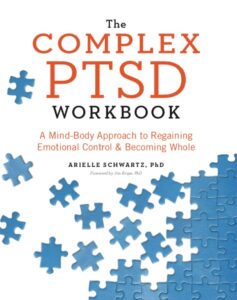There is a paradigm shift happening in the field of psychology; a change from a focus on deficits to an emphasis on resilience and strengths. In recent years researchers have looked at the traits associated with individuals who have not only overcome obstacles but have thrived when faced with them. We have come to understand that resilience is comprised of a set of behaviors that can be learned and developed in anyone.
“The truth is we can all feel weighed down by life’s challenges. Let us raise the roof with resilience and push beyond the limitations that can press down on us.”
-Dr. Arielle Schwartz
Working as a clinical psychologist, EMDR Therapist and trauma specialist, many hours are spent listening to stories of pain, abuse, and loss. Early in my career I felt the stress and burnout that accompanies this work. Experiencing compassion fatigue radically changed my approach to work from trauma-focused psychotherapy to resilience-informed treatment. Incorporating positive psychology increases my overall happiness and clients benefit as well. This approach focuses on strengths and capabilities rather than deficits and psychopathology. You can learn more by watching Dr. Martin Seligman’s Ted Talk discussing the factors associated with leading happy, meaningful, and fulfilling lives.
When it comes to treating trauma, applying the science of positive psychology allows us to broaden our perspective. We recognize that traumatic experiences can be horrifically, terrifyingly painful and we acknowledge the human capacity to be resilient in the face of traumatic events, to be strengthened by adversity, and to be transformed by the process. This process is referred to as post traumatic growth with accompanying life changes including :
I believe resilience is an extraordinary topic. I have been presenting and writing on resilience for some time. Recently, I watched another great Ted Talk by Jane McGonicgal; a game designer who suffered from a concussion and consequently was bed ridden and suicidal for nearly a year. She decided to make a game out of her recovery and created a forum for others to play online. She shares scientifically validated strategies to enhance four types of resilience: physical, mental, emotional, and social.
I got pretty jazzed after watching her talk. So, I decided to raise the roof on resilience. I decided to make a list of all of the activities that I engage in throughout my week that strengthen my resilience. Rather than finding 3, or 5, or 10 activities I had more than 20 items after the first day. Here is what the Urban Dictionary has to say about raising the roof:
Here is my personal list of self-care resilience practices. I encourage you to share yours in the comments below. When we work together to increase our mutual potential we all win.
Read more some of my favorite resilience practices:

The Complex PTSD Workbook, now available on Amazon! Click here to check it out and increase your toolbox for healing. Whether you are a client or a therapist this book will offer a guided approach to trauma recovery.
Dr. Arielle Schwartz is a licensed clinical psychologist, wife, and mother in Boulder, CO. She offers trainings for therapists, maintains a private practice, and has passions for the outdoors, yoga, and writing. Dr. Schwartz is the author of The Complex PTSD Workbook: A Mind-Body Approach to Regaining Emotional Control and Becoming Whole. She is the developer of Resilience-Informed Therapy which applies research on trauma recovery to form a strength-based, trauma treatment model that includes Eye Movement Desensitization and Reprocessing (EMDR), somatic (body-centered) psychology and time-tested relational psychotherapy. Like Dr. Arielle Schwartz on Facebook, follow her on Linkedin and sign up for email updates to stay up to date with all her posts.

Arielle Schwartz, PhD, is a psychologist, internationally sought-out teacher, yoga instructor, and leading voice in the healing of PTSD and complex trauma. She is the author of five books, including The Complex PTSD Workbook, EMDR Therapy and Somatic Psychology, and The Post Traumatic Growth Guidebook.
Dr. Schwartz is an accomplished teacher who guides therapists in the application of EMDR, somatic psychology, parts work therapy, and mindfulness-based interventions for the treatment of trauma and complex PTSD. She guides you through a personal journey of healing in her Sounds True audio program, Trauma Recovery.
She has a depth of understanding, passion, kindness, compassion, joy, and a succinct way of speaking about very complex topics. She is the founder of the Center for Resilience Informed Therapy in Boulder, Colorado where she maintains a private practice providing psychotherapy, supervision, and consultation. Dr. Schwartz believes that that the journey of trauma recovery is an awakening of the spiritual heart.
Beyond Trauma: A Guided Mind-Body Journey of Resilience, Hope and Post-Traumatic Growth
Vagal Toning for Vibrant Health
Intensive Trauma Treatment Certification Retreat